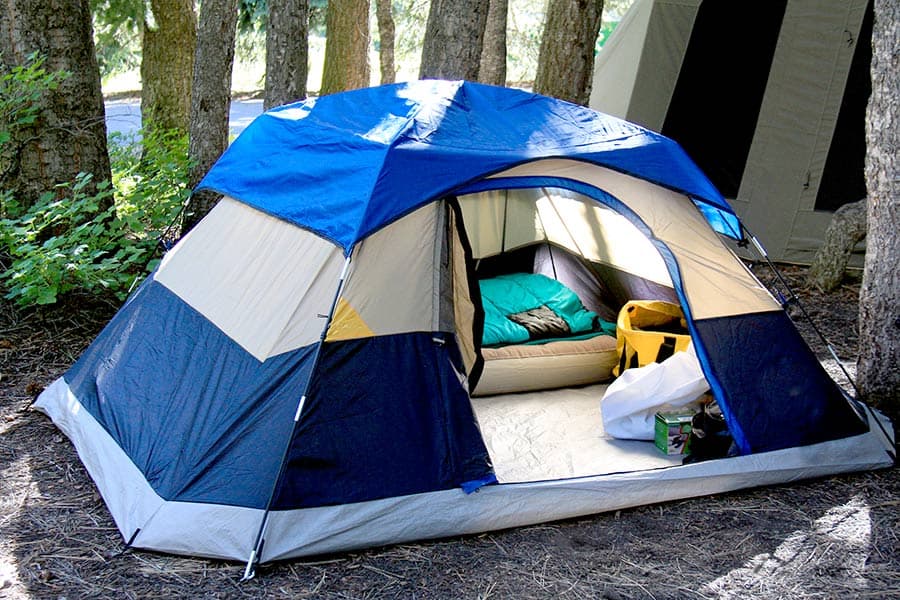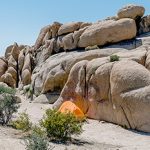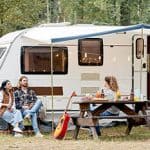
Something is refreshing about surrounding yourself with the great outdoors. Camping allows you to saturate all five of your senses with unique experiences you can’t find when you’re keeping up with the day to day demands of our digital age. But as freeing as camping can be, there are considerations to make when you’re out there.
Do tents often get stolen at campsites? The truth is, tents are not a frequent target when it comes to campsite robbery. Dedicated thieves don’t often venture to campsites for the sole purpose of tent theft, and other people you encounter are fellow campers that already have their accommodations.
Continue reading to find out if it is okay to leave items in your tent, how to avoid being robbed, what are some of the common things that get stolen, and some solutions to preventing theft.
When you leave your house, you’re probably not worried that it won’t be there when you return. But when you leave your tent unattended, those same securities don’t apply.
Getting away from all the stresses and anxieties of our daily lives doesn’t have to be a trade-in for worries and fears of camp life. Leaving your tent unattended for the day while you embark on a hike is standard practice, and you’re entirely free to focus on the day’s activities. However, there are still some considerations that you should take to avoid unwanted situations.
Should You Worry About Your Tent Getting Stolen?
No two campsites are the same. Some encourage community gathering where tents will be closer together in wider spaces, while others allow you to find a secluded spot away from others. Sometimes a ranger will be present, but this depends on how each camp’s management decides to operate. Wherever you find yourself camping, check with the camp staff and find out if robberies are common to that campsite.
While your tent itself may not be in danger of being stolen, it’s still good to practice safe security habits. You wouldn’t want to leave your valuables unattended in a public space, and the same is true when you’re camping. If you don’t need it on a hike or at the campsite, then it’s best left at home or in the car. If you’re going to leave valuables in the car, then make sure it’s secure in the trunk or out of sight.
What about keeping your valuables in a tent that is secure with a locked zipper? Don’t even bother with this option. A simple sharp edge can bypass all tent security. You don’t want to draw a thief’s attention, and a locked zipper lets them know that you have items worth securing. Even if you don’t have valuable items in there, a thief could still be curious to see what’s inside, and you’ll end up with a big hole in your tent.
What’s Okay to Leave in an Unattended Tent?
While it’s true that some people won’t hesitate to steal items from campsites, it’s also true that those same people would never think twice about taking your camping gear, let alone your tent.
However, usually, the only people at campsites who need camping gear are fellow campers who brought their equipment for the trip. Items like lanterns, flashlights, sleeping bags, sleeping pads, and other things of the sort are probably safe to leave unattended.
Also, remember, don’t leave any food in your tent or anywhere at your campsite. Food is an open invitation for critters and other wildlife, and you may come back to find a shredded tent and a horrible mess that can put an abrupt end to your camping trip. Whenever you have finished eating, be sure to store all extra food in a way that doesn’t invite wildlife.
Related Posts:
- Can You Pitch A Tent On Gravel?
- How to Inflate an Air Mattress When Camping
- Why Are Camper Vans So Expensive?
Best Practices to Avoid Robbery
It’s best to plan on bringing only items that are essential to your camping trip. But this is the digital age after all, and these days, separation from mobile devices and other electronics may not be possible. Furthermore, even some of your essential camping items are at risk. Though some things are at risk is not a cause for concern, though. As long as you practice safe habits, then your chances of being a victim of robbery are very low.
The Most Common Campsite Thefts
Most robberies occur in the night or while campers are hiking at the trailheads. Some campsites are more populated than others, so it’d be hard for a thief to make a clean steal without being spotted. Always be aware of the surroundings, and if you can, build rapport with fellow campers who are willing to keep an extra eye on your campsite while you’re off hiking. Just make sure you do the same for them.
Another common area that thieves like to scout is the campsite’s parking lot. Make sure to lock at your vehicle at all times, and do not store valuables in a place where they are visible. Determined thieves know how to enter locked vehicles, so don’t display anything that will entice them.
Check out these five items to help you have a better camping experience:
- Biodegradable Liquid Soap
- Microfiber Towels
- 300W Power Inverter
- Battery Operated Fan
- Square Pie Iron
Most Common Stolen Items at Campsites
Besides obvious things like expensive electronics, the most stolen items from campsites include radios, expensive clothing, and coolers. Other items that might be common targets at campsites include:
- Cameras
- Electronics such as musical devices or video game systems
- Wallets
- RV Batteries
- Bicycles
- Generators
- RVs
If you plan on taking any of these things on your camping trip, do not leave them out in the open and unattended. If they’re not in use, then they should be stored in a secure location and out of view.
The best way to protect anything valuable is to carry them on you. Pack a backpack or a money belt with all your valuables and take it with you wherever you go. Even when using the restroom or taking a shower, make sure it’s within sight. The most opportune moment for a thief to do their work is when you’re not paying attention. Don’t give them that chance.
Other common targets are just too big or cumbersome for you to carry with you. These items include RV batteries, generators, and bicycles, and even entire RVs. Luckily, there are ways of securing them in a way that you can enjoy your trip without having to worry about their security continually. Here are a couple solutions you can utilize for your larger items:
- Locking Cable: These work exactly like the way bike locks work, except these are heavy duty. You can use it to secure your items to an RV or a tree. As long as it’s locked, a thief won’t be able to take it. Just make sure you keep the key on you.
- Coupling Lock: You can store all of your valuables away in an RV and lock it tight, but what’s to stop a thief from attaching your RV to their vehicle and driving away while you’re off hiking? The answer is a coupling lock. It fits securely into the trailer ball socket and is a worthy investment for camping security.
Should you encounter a theft in progress, it’s vital to utilize common sense and don’t put yourself in danger. A shout is enough to deter the criminal, as they want nothing to do with you, only your valuables. If they run, don’t chase them down. Report all information you obtain to a ranger and let them take the necessary measures to catch the criminal.
In Conclusion
Camping is always a fantastic way to unplug from the demands of day to day life. There’s no need to worry about your tent getting stolen, as these occurrences are far and few between.
Thieves are after things that they can resell at a high value. But as long as you stay alert and adhere to common safety practices, the only thing you’ll need to worry about on your camping trip is enjoying it as much as you can before it’s time to go back.





